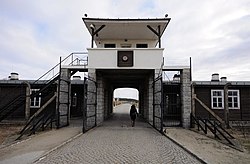Rogoźnica, Lower Silesian Voivodeship
Rogoźnica | |
|---|---|
Village | |
 Gross-Rosen Museum in Rogoźnica at the former Nazi German concentration camp Gross-Rosen from World War II | |
| Coordinates: 51°00′35″N 16°17′29″E / 51.00972°N 16.29139°E | |
| Country | |
| Voivodeship | Lower Silesian |
| County | Świdnica |
| Gmina | Strzegom |
| Population | 856 |
| Time zone | UTC+1 (CET) |
| • Summer (DST) | UTC+2 (CEST) |
Rogoźnica (Polish pronunciation: ['rɔɡɔʑˈɲit͡sa]) is a village in the administrative district of Gmina Strzegom, within Świdnica County, Lower Silesian Voivodeship, in south-western Poland.[1] Rogoźnica lies approximately 7 kilometres (4 mi) north-west of Strzegom, 21 kilometres (13 mi) north-west of Świdnica, and 54 kilometres (34 mi) west of the regional capital Wrocław.
The oldest known mention of Rogoźnica comes from a document from 1291.[2] It was also mentioned in the medieval Polish chronicle Liber fundationis episcopatus Vratislaviensis, created a few years later. It was part of medieval Poland ruled by the Piast dynasty. In later periods the village was also part of Bohemia, Hungary, Austria, Prussia and Germany, before being reintegrated with Poland in 1945 after the defeat of Nazi Germany in World War II. There are two historic churches in the village: the church of Simon and Jude Thaddeus and the church of Our Lady of the Rosary.
Gross-Rosen[edit]

During World War II Rogoźnica was the site of the Nazi German Gross-Rosen concentration camp where 40,000 prisoners perished. By 1944, the number of Gross-Rosen subcamps reached 100. The most numerous ethnic groups imprisoned in the Gross-Rosen network were Jews (from various European countries), Poles and citizens of the former Soviet Union.[3] Nowadays the Gross-Rosen Museum in Rogoźnica is located at the site, it is a branch of the Historical Museum of Wrocław. The stone memorial to victims of the camp, containing ashes collected at the site was unveiled in 1953 and rebuilt in 1985.[4]
Gallery[edit]
-
Saints Simon and Jude Thaddeus church
-
Our Lady of the Rosary church
-
Train station
-
Entrance gate to the former Nazi German Gross-Rosen concentration camp
References[edit]
- ^ "Central Statistical Office (GUS) – TERYT (National Register of Territorial Land Apportionment Journal)" (in Polish). 2008-06-01.
- ^ Stanisław Jastrzębski, Jawor i okolice, Ossolineum, Wrocław, 1973, p. 139 (in Polish)
- ^ "History of KL Gross-Rosen". Gross-Rosen Museum in Rogoźnica. Retrieved 12 February 2020.
- ^ "Muzeum Gross-Rosen in Rogoźnica". Muzeum w Rogoźnicy. Retrieved 19 February 2014.







